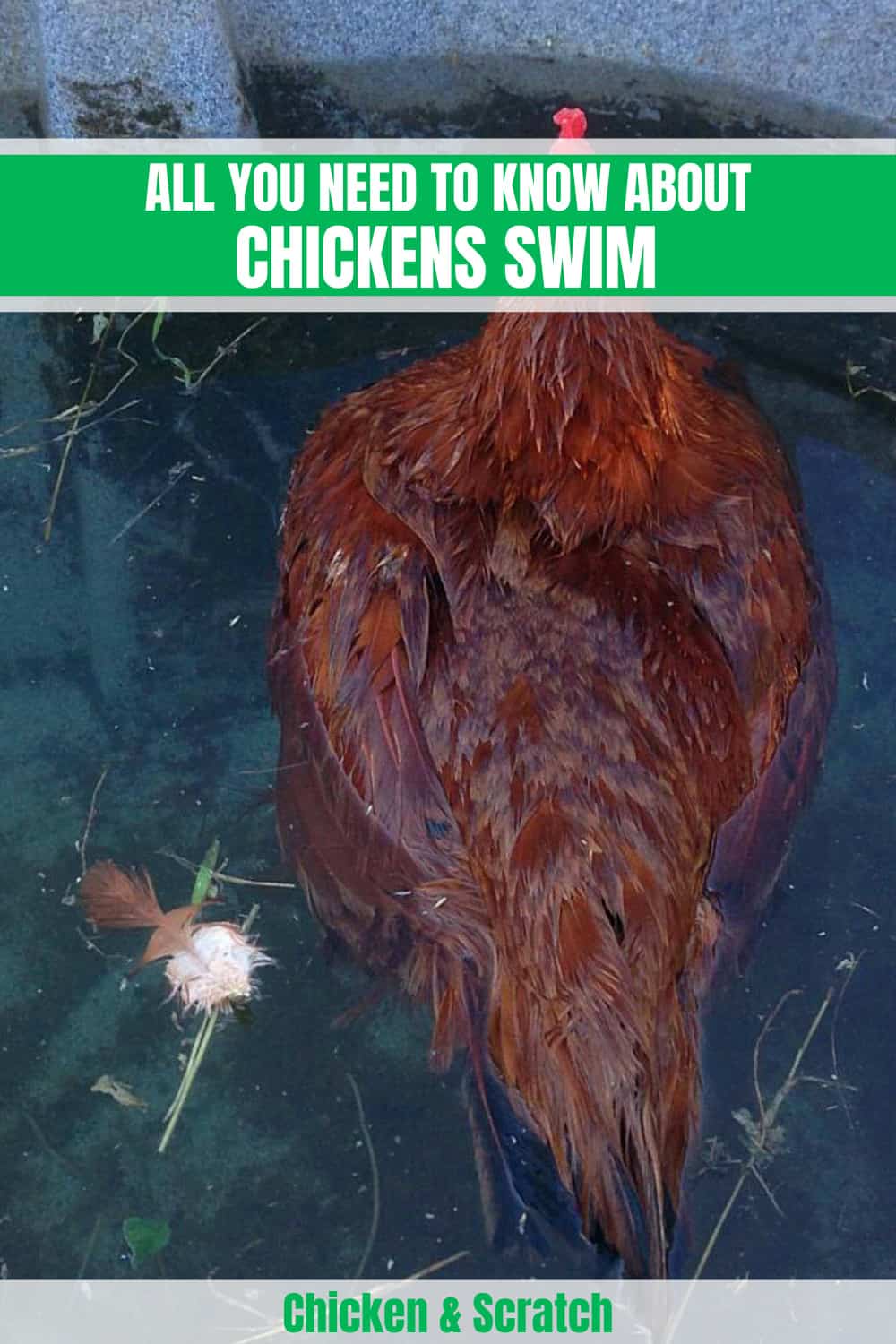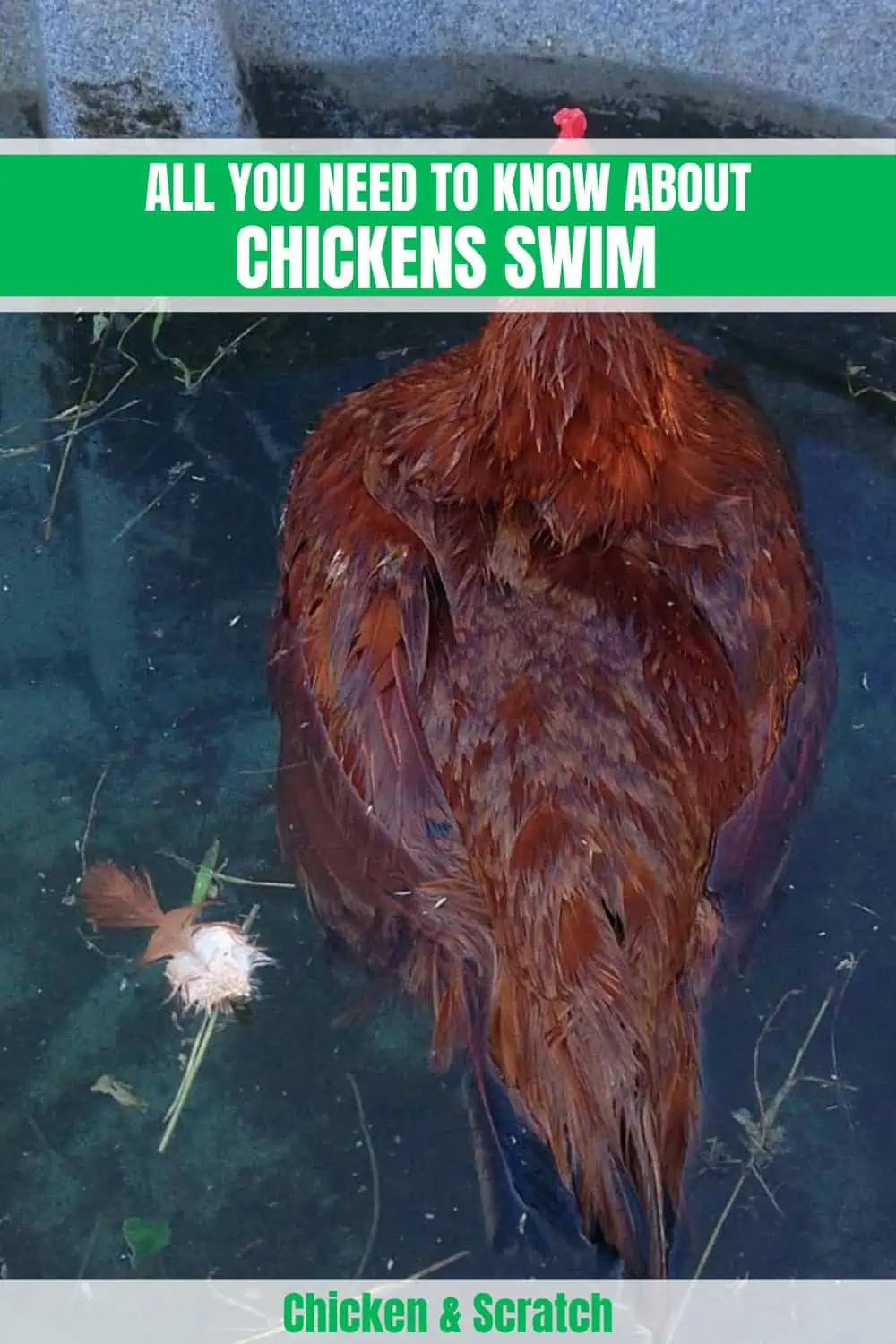Perhaps you looked at chickens and wondered if they had the ability to swim like salmon and trout. Maybe it never entered your head whether chickens could swim, and you had always assumed that they couldn’t swim. Don’t feel too bad. Most people seem to have mistakenly believed that the not-so-graceful chicken couldn’t swim.
The Answer in a Nutshell
Truth be told, chickens can swim! However, while they have the ability to swim in water, most will never experiment too much with this. A few reasons exist for this, such as:
- No waterproof feathers
- No special oil glands
- No webbed feet
- No way to position in the water
In comparison to ducks, chickens didn’t evolve to swim in water in the same way. They can swim, but that doesn’t mean that they should swim. If you put the chicken into a survival setting, they could swim in the water. They couldn’t build the same momentum as ducks, and they couldn’t paddle because of their feet. Still, a chicken could swim if needed.
Most likely, their ability to swim comes from a long-held trait that they may have needed long ago. To put it into perspective, doves fly, but chickens only flap their wings briefly and cannot sustain flight. The same goes for ducks and chickens. Ducks swim because they have it as part of their innate ability. While chickens can swim, that doesn’t mean that they will do it well.
You have one other reason that chickens never became the Michael Phelps of the bird world. Unlike ducks, chickens don’t secrete oils with their feathers. Once chickens get their feather soaked, they sink faster than a stone to the bottom. For that reason, you should never leave a chicken alone in water deep enough to drown in. It most likely will.
One of the biggest factors that determine whether the chicken sinks or swims depends on how much it panics. Many chickens stay calm, and they will do fine for a short time, but the birds that panic will drown much faster. The birds that have a calmer disposition will perform better at swimming than those who panic on the water.
Important to note, please don’t put your birds in a pool with chlorine because we don’t know what effects could arise from it. We don’t know how oxidizers, sanitizers and algaecides could have an impact on the bird. While the chicken might experience no ill side effects, the chemicals in a pool can kill frogs.
Chickens Love Water
One of the interesting facts about chickens: They love water. If you were to bring your chicken to a natural body of water, most of them will love it. Despite how their natural design roadblocks them from enjoying it more, these birds can and will swim when necessary.
You might take your chickens for a cool down, but you want to make sure that they stay supervised. Stories have even surfaced of chickens drowning in a bucket of water. That should demonstrate to you that these birds need a guardian with them while in the water.
You have to remember that chickens weren’t designed by nature to swim long term. Like an individual who likes spicy food, but his stomach doesn’t handle it well-the same could be said of chickens.
Sometimes, you will see chickens use water to bathe or to play. You might give them a small amount of water to play in.
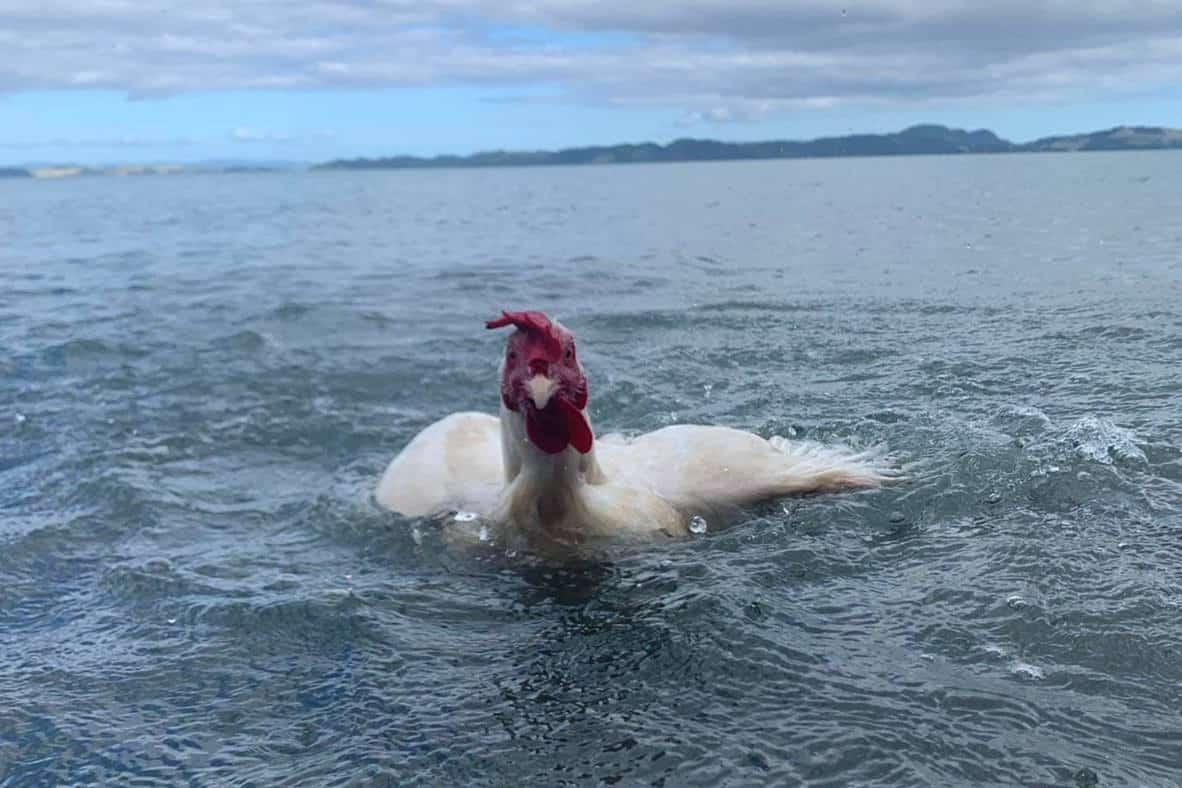
Some people believe that chickens have a natural ability to swim without even being taught. It comes from its survival instinct. As soon as you place it in water, its survival instinct kicks in. Never place baby chicks in water because they can’t swim. In fact, people have found how chicks in a waterlogged area drowned immediately.
You must remain aware of another danger from putting your chicken in water. After your chicken finishes its swim, you want to dry him off fast. In particular, a cold, sharp breeze can lead to a chicken catching hypothermia, and he will die of it quickly.
With chickens, the one thing to remember is that no two chickens will have the same temperament. While your polish chicken loves the water, your grey junglefowl might panic when put in water. Panic leads to drowning. Drowning leads to death.
If you build a pool for chickens, you want it shallow enough for it not to drown, and you want to provide them with an easy escape. Chickens resemble cats with water. While they might enter the water, their ultimate goal is to leave it.
Swimming but Limited
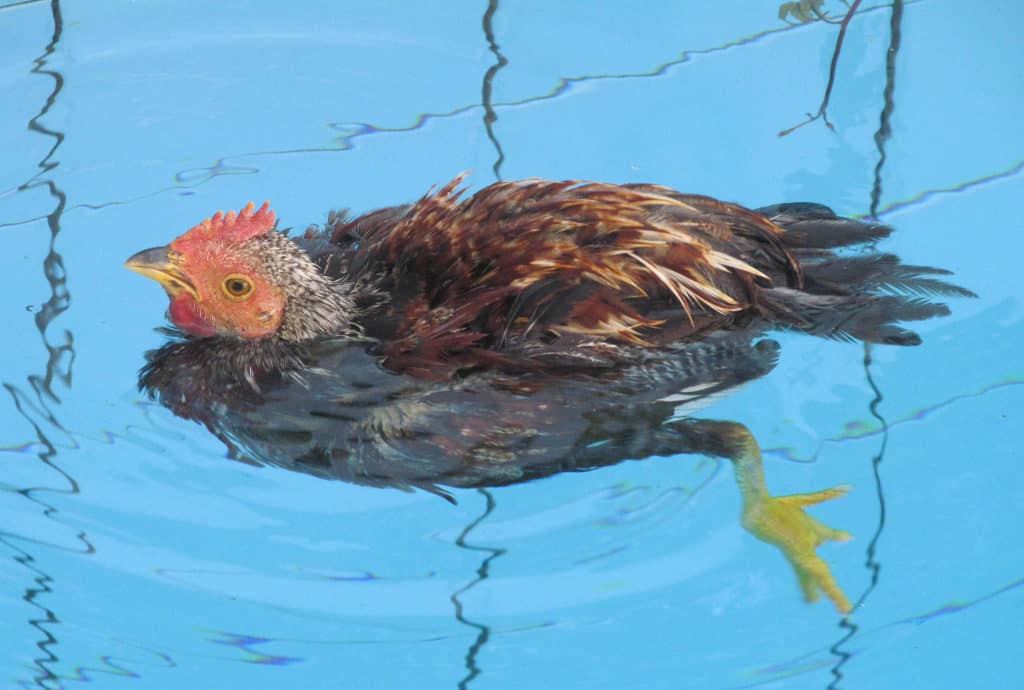
Chicken can swim, but they have limited motion, and you shouldn’t expect them to swim like a duck or a crane. One of the funny things to demonstrate a lack of swimming ability comes from its feathers. As the feathers get saturated with water, they will sink like a stone. Strangely, raindrops have a similar impact on them.
Many times, you will see chickens head out into a light drizzle, but they will run for shelter in a downpour. In cold rain, the water can cause hypothermia. They could die. The other danger comes from flooding which will cause the chickens to drown if they can’t escape in time.
In some cases, you may want to keep your chickens out of the rain simply because even if they don’t die from the water, they won’t be as strong and hardy as what they once were.
Have a morsel fun fact about chickens: They love to play! In fact, chickens live and die for play, which might be why they like to enter the water, but they soon decide against it. In a natural setting, you will see chickens run, jump and take dust baths each day. That should demonstrate the character of the chicken.
Naturally, chickens will run scared of large bodies of water. In addition, you usually won’t see a chicken seek out swimming. Usually, they won’t attempt to swim on their own because of the dangers associated with it. They do this almost strictly for the sake of survival. You won’t see a chicken seek out water to swim on its own.
What seems interesting about this is that ducks, rats, horses and cats all know how to swim on instinct. Humans seem to be one of the few creatures that don’t naturally know how to swim. We have to learn how to swim or sink like an anchor. In general, you might think of chickens as able to swim for a short distance, but you wouldn’t want them in the water unsupervised for long.
Same Animal That Drowns in a Bucket of Water
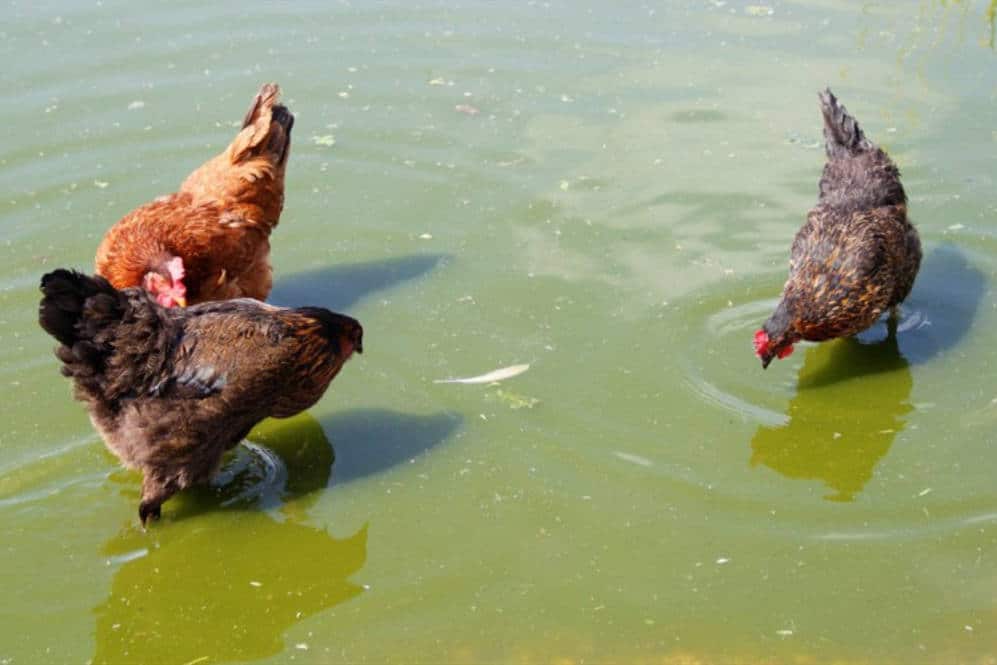
Chickens have a reputation for drowning in buckets of water, which should answer any questions as to whether they can swim or not. Important to note, earlier we said that chickens don’t secrete oil from their glands. We should clarify that they don’t produce it in the same way that ducks do. Still, chickens produce around 10 percent of the oil that ducks produce.
You could say that a healthy chicken could probably swim anywhere from 10 to 20 minutes before it experienced serious problems. It would need to exit the water before that point or risk drowning. When the chicken becomes submerged in the water, it will inevitably drown.
Usually, you don’t want to force a chicken to swim because you will have an angry wet hen. Some, however, do live for the occasion to swim in the water a bit. In fact, on hot days, some chickens have even been known to enter the water to cool off. This, however, isn’t common behavior.
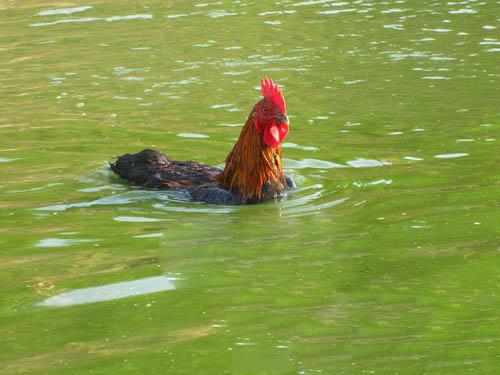
As the chicken exits the water, he will proceed to shake off as much of the water as possible, much like how a dog might shake off the water. Chickens like to swim, but you wouldn’t necessarily call it essential to their life like how you would with a duck.
Ducks differ much from chickens in this way. Chickens prefer not to swim when they don’t have to. In fact, they most likely developed the instinctual ability to swim through harsh rains that might have drowned them otherwise.
Another thing that can help a chicken to last longer in the water comes when it swims in the water without moving a muscle. This will help it to stay afloat longer, it is most likely the reason that a panicked chicken will drown much faster. Some people might even argue that chickens don’t swim at all. Instead, they float, but as their feathers get wet, they will gradually lose buoyancy.
Summary
Hopefully, this sheds some light on the question of can chickens swim. Most people probably aren’t even aware that they can somewhat float when in water. That doesn’t mean that you should grab one and toss him into the nearest pool because you have to consider the chicken’s overall temperament and if he would like it.

Joseph Hudson has been raising chickens for over 15 years. In 2018, he completed the Agriculture & Natural Resources program at Mt. San Antonio College. He currently raises over 1400 chickens on his 7.5-hectare farm. He keeps sharing his experience on raising healthy and happy chickens on Chicken Scratch The Foundry.
